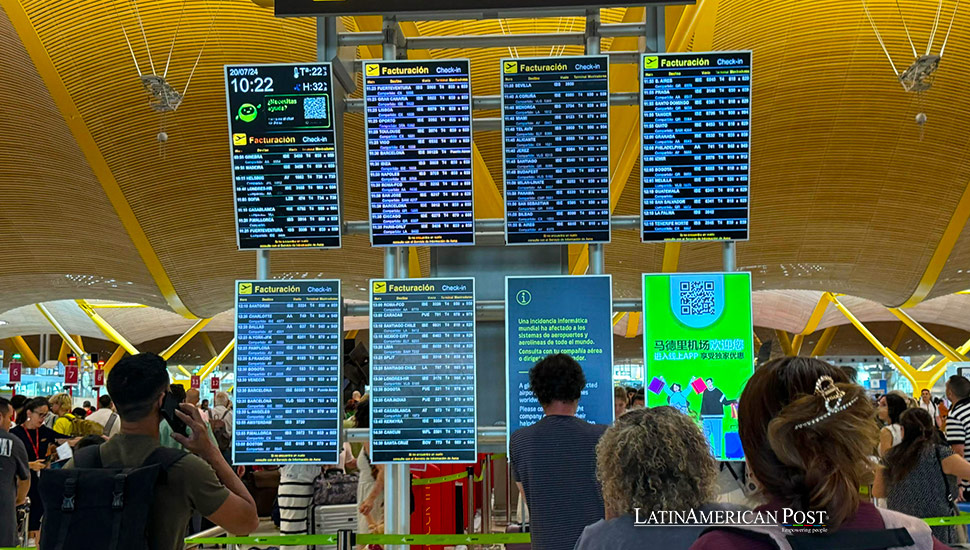Latin America Reels from Global Microsoft Outage Disruptions

A global computer outage caused by a faulty CrowdStrike update on Microsoft Windows systems disrupted essential services across Latin America, highlighting the vulnerabilities in interconnected industries like banking, aviation, media, and healthcare. This feature explores the impact and recovery in the region.
Users and businesses across various essential industries in Latin America, including banking, aviation, media, and healthcare, are recovering from what is being called the “largest computer outage” in history. The disruption was caused by an error in a CrowdStrike update for the Microsoft Windows operating system, which led to systems freezing on the infamous “blue screen of death,” as explained by CrowdStrike CEO George Kurtz on social media platform X.
The cybersecurity expert Troy Hunt, who runs the popular cyber information website HaveIBeenPwned, confirmed the outage’s global scale, calling it the most significant computer blackout ever recorded.
A Call for Calm: Not a Cyberattack
Kurtz emphasized that the incident was not a security breach or cyberattack but an isolated issue for which support was provided to help customers update their systems. According to IT experts consulted by EFE, the latest update of Falcon drivers contained errors that immediately affected Azure, Microsoft’s cloud computing platform used for building, testing, deploying, and managing applications and services.
This led to the widespread appearance of blue screens indicating system failures and needing to reboot servers. Kurtz apologized for the disruptions and assured that CrowdStrike’s engineers had resolved the problem, although he warned that it might take time for some clients to restore operations fully.
Aviation Sector in Latin America
The Microsoft outage caused passenger check-in issues, network connection errors, and airline information system failures globally, leading to mass flight cancellations and delays. Latin American countries, including Argentina, Panama, the Dominican Republic, Peru, Honduras, and Chile, experienced minimal disruptions, with national and international airlines reporting mostly normal operations.
However, some Latin American countries felt the impact more significantly. For instance, although the aviation infrastructure was less directly affected in Mexico due to proprietary systems protected against external interferences, there were still delays and cancellations in international flights. Conversely, Brazil saw problems in some customer service channels of electricity distributors and instability in banks like Bradesco, Next, Neon, and Banco Pan. Nonetheless, air traffic control and electrical supply services remained stable.
In Panama, Tocumen International Airport experienced minor delays, while in Argentina, Aerolineas Argentinas reported brief interruptions in their ticketing and check-in systems but quickly implemented contingency plans to minimize the impact.
Impact on Banking and Healthcare
The outage’s effects extended beyond aviation. Latin America’s banks, institutions, organizations, and hospitals also faced significant disruptions. In Brazil, some banks reported instability and certain hospitals experienced delays in accessing patient information, although critical services continued with backup systems.
In Mexico, the financial sector reported minor disruptions, but most banks maintained operations without significant impact thanks to robust cybersecurity measures. Hospitals across the region faced varying interruptions, with some needing to postpone non-urgent procedures while prioritizing emergency care.
Argentina’s healthcare system avoided significant disruptions, with hospitals using manual processes to continue patient care while systems were restored. Similarly, in Chile, healthcare services experienced only brief interruptions, with quick recovery times reported.
Recovery and Resilience
Recovery and Resilience in Latin America the global outage, while highlighting the interconnectedness and vulnerabilities of Latin America’s essential services, also showcased the region’s resilience and quick recovery efforts. The incident underscored the importance of robust cybersecurity measures and contingency planning, but also the region’s ability to bounce back.
In response to the outage, Latin American governments and private sectors are re-evaluating their cybersecurity strategies to prevent similar incidents. The urgent need for enhanced collaboration between regional countries to strengthen their defenses against such disruptions has never been more apparent. This incident serves as a stark reminder of the necessity for robust cybersecurity measures and comprehensive contingency planning.
This incident serves as a stark reminder for Latin America to invest in more resilient and secure IT infrastructures. As industries recover, it is crucial that improved coordination and response strategies are urgently implemented to mitigate the risks of widespread disruptions and ensure the stability of essential services.





